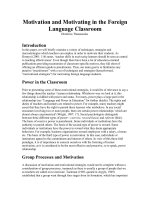ETHICS AND COMMUNITY IN THE HEALTH CARE PROFESSIONS docx
Bạn đang xem bản rút gọn của tài liệu. Xem và tải ngay bản đầy đủ của tài liệu tại đây (957.29 KB, 218 trang )
ETHICS AND COMMUNITY IN
THE HEALTH CARE
PROFESSIONS
Recently debate about the relationship between individual and
community has become central to the making of social policy in
Europe, the United States and elsewhere. Community approaches are
particularly fashionable in discussion of health care. Philosophical
treatment of medical ethics has also come to focus on the conflict
between liberal forms of patient-centred medicine and communitarian
values. How far do patients’ rights need to be protected from
community’s imperatives and how far do communities themselves need
to be protected?
This book is the first to explore the importance of these conflicting
approaches to health care and examines the implications of these
approaches both for medical ethics and for specific areas of health care
practice. Among the topics discussed are:
• Liberal and communitarian views on the allocation of
health care resources
• Young people and family care
• A European perspective on the role of IT in genetic
counselling
• Health care decision-making for elderly patients
Ethics and Community in the Health Care Professions provides an
accessible introduction to, and analysis of, a major debate in health
care. It will be invaluable to both students and practitioners.
Michael Parker is Co-ordinator of a European Union research project
on biomedical practitioners’ ethics education. He is the author of The
Growth of Understanding (1995).
PROFESSIONAL ETHICS
Editor: Ruth Chadwick
Centre for Professional Ethics, University of Central
Lancashire
Professionalism is a subject of interest to academics, the general public and
would-be professional groups. Traditional ideas of professions and
professional conduct have been challenged by recent social, political and
technological changes. One result has been the development for almost every
profession of an ethical code of conduct which attempts to formalise its values
and standards. These codes of conduct raise a number of questions about the
status of a ‘profession’ and the consequent moral implications for behaviour.
This series seeks to examine these questions both critically and
constructively. Individual volumes will consider issues relevant to particular
professions, including nursing, genetic counselling, journalism, business, the
food industry and law. Other volumes will address issues relevant to all
professional groups such as the function and value of a code of ethics and the
demands of confidentiality.
Also available in this series:
ETHICAL ISSUES IN JOURNALISM
AND THE MEDIA
Edited by Andrew Belsey and Ruth
Chadwick
GENETIC COUNSELLING
Edited by Angus Clarke
ETHICAL ISSUES IN NURSING
Edited by Geoffrey Hunt
THE GROUND OF PROFESSIONAL
ETHICS
Daryl Koehn
ETHICAL ISSUES IN SOCIAL
WORK
Edited by Richard Hugman and
David Smith
FOOD ETHICS
Edited by Ben Mepham
CURRENT ISSUES IN BUSINESS
ETHICS
Edited by Peter W.F.Davies
THE ETHICS OF BANKRUPTCY
Jukka Kilpi
ETHICAL ISSUES IN ACCOUNTING
Edited by Catherine Gowthorpe and John
Blake
ETHICS AND VALUES IN HEALTH
CARE MANAGEMENT
Edited by Souzy Dracopoulou
ETHICS AND
COMMUNITY IN
THE HEALTH CARE
PROFESSIONS
Edited by Michael Parker
London and New York
First published 1999
by Routledge
11 New Fetter Lane, London EC4P 4EE
This edition published in the Taylor & Francis e-Library, 2002.
Simultaneously published in the USA and Canada
by Routledge
29 West 35th Street, New York, NY 10001
© 1999 Selection and editorial matter Michael Parker; individual
contributions © 1999 respective contributors
The right of selection and editorial matter Michael Parker; individual
contributions, the contributors to be identified as the editor and
contributors of this Work has been asserted by them in accordance with
the Copyright, Designs and Patents Act 1988
All rights reserved. No part of this book may be reprinted or reproduced
or utilised in any form or by any electronic, mechanical, or other
means, now known or hereafter invented, including photocopying and
recording, or in any information storage or retrieval system, without
permission in writing from the publishers.
British Library Cataloguing in Publication Data
A catalogue record for this book is available from the British Library
Library of Congress Cataloguing in Publication Data
Ethics and community in the health care professions/edited by
Michael Parker, p. cm. —(Professional ethics)
Includes bibliographical references and index.
1. Medical ethics—Social aspects. 2. Communitarianism—Health
aspects. 3. Medical personnel—Moral and ethical aspects.
4. Professional ethics. I. Parker, Michael, 1958–. II. Series. R725.5.E87
1999 174’.2–dc21 98–35439
ISBN 0-415-15027-2 (hbk)
ISBN 0-415-15028-0 (pbk)
ISBN 0-203-01038-8 Master e-book ISBN
ISBN 0-203-20567-7 (Glassbook Format)
v
CONTENTS
Notes on contributors vii
Series editor’s preface x
Introduction: health care ethics: liberty, community or
participation? 1
MICHAEL PARKER
1 The health service as civil association 15
ANDREW EDGAR
2 All you need is health: liberal and communitarian
views on the allocation of health care resources 30
HUB ZWART
3 Return to community: the ethics of exclusion and
inclusion 47
CHRIS HEGINBOTHAM
4 Community disintegration or moral panic? Young
people and family care 62
DONNA DICKENSON
5 Contracting care in the community 79
MICHAEL HAMMOND
vi
6 Virtual genetic counselling: a European perspective
on the role of information technology in
genetic counselling 96
RUTH CHADWICK AND KIM PETRIE
7 Cultural diversity and the limits of tolerance 112
SIRKKU HELLSTEN
8 Ethics, community and the elderly: health care
decision-making for incompetent elderly patients 135
MARK R.WICCLAIR
9 Power, lies and injustice: the exclusion of service
users’ voices 154
VIVIEN LINDOW
10 Ethical codes: the protection of patients or
practitioners? 172
J.STUART HORNER
References 188
Index 201
CONTENTS
vii
CONTRIBUTORS
Ruth Chadwick is Head of Centre and Professor of Moral
Philosophy at the Centre for Professional Ethics at the University
of Central Lancashire. Her publications include the four-volume
edited collection, Kant: Critical Assessments; Ethics,
Reproduction and Genetic Control; The Encyclopaedia of
Applied Ethics and a large number of papers in learned journals.
She is joint series editor of the Routledge series on Professional
Ethics. She is Secretary of the International Association of
Bioethics and a member of the National Committee for
Philosophy.
Donna Dickenson is Leverhulme Senior Lecturer in Medical Ethics
and Law at Imperial College, London. She is the author of Property,
Women and Politics: Subjects or Objects?, Cambridge: Polity Press,
1997. She is also the author, with Michael Parker, of a series of ten
workbooks on core themes in medical ethics.
Andrew Edgar is a Lecturer in Philosophy at the University of
Wales, Cardiff, and Director of the Centre for Applied Ethics. He
has published papers in a number of areas of philosophy and
applied ethics and has directed a European Union funded
research programme on the ethics of health-related quality of life
studies.
Michael Hammond is a Lecturer in Philosophy at Lancaster
University. He is the author of Understanding Phenomenology,
Oxford: Blackwell, 1991.
Chris Heginbotham is the Chief Executive of East and North
Hertfordshire Health Authority. Prior to this he was Chief
Executive of Riverside Mental Health Trust, and for much of the
1980s was National Director of MIND, the National Association
viii
for Mental Health. He is Visiting Senior Fellow at the University
of Birmingham Health Services Management Centre. His most
recent book, co-authored with Professor Tom Campbell, is
Mental Illness: Prejudice Discrimination and Law, Aldershot:
Gower, 1991.
Sirkku Hellsten is a Research Fellow in Philosophy at the University
of Helsinki, Finland and is also Visiting Fulbright Fellow at the
Ethics Center, University of South Florida. She has published
articles on applied ethics and social and political philosophy,
particularly on the subjects of justice and the liberal-communitarian
debate. She is the author of In Defence of Moral Individualism,
North-Holland, 1997. She is currently working on a research project
on the ethics of biotechnology.
J.Stuart Horner is a Visiting Professor in Medical Ethics at the
University of Central Lancashire. He was previously a Director of
Public Health in Croydon, Hillingdon, Preston and North West
Lancashire. He now writes on medical ethics related to public
health. Formerly the chair of its Medical Ethics Committee,
Professor Horner is now a Vice-President of the British Medical
Association.
Vivien Lindow is an independent consultant, trainer, researcher and
writer on mental health issues in Bristol, England. She works from a
critical perspective as someone who has received mental health
services.
Michael Parker is a Lecturer in Medical Ethics at Imperial College
School of Medicine, London. He co-ordinates a European Union
research project on biomedical ethics practitioner education. He is
the author of a number of papers and books on the liberalism-
communitarianism debate including, The Growth of Understanding:
Beyond Individuals and Communities, Aldershot: Avebury, 1995,
and on medical ethics more generally. He is also the author, with
Donna Dickenson, of a series of ten workbooks on core themes in
medical ethics.
Kim Petrie is from Prince Edward Island, Canada and is currently a
researcher at the Centre for Professional Ethics funded by the
Canadian Society for International Health and the Canadian
Department of Foreign Affairs and International Trade. She is
currently carrying out research into the legal, social and ethical
issues which arise in genetic research involving children.
NOTES ON CONTRIBUTORS
ix
Mark R.Wicclair is Professor of Philosophy and Adjunct Professor of
Community Medicine at West Virginia University. He is also
Visiting Professor of History and Philosophy of Science and
Visiting Professor of Medicine at the University of Pittsburgh. He
has published extensively in the areas of ethics and medical ethics
and is the author of Ethics and the Elderly, New York and Oxford:
Oxford University Press, 1993.
Hub Zwart is Director of the Centre for Ethics at the Catholic
University of Nijmegen in the Netherlands. He has published
several books and articles on philosophical, ethical and bioethical
issues. He is editor in chief of the Dutch Journal for Medicine and
Ethics. Recently he published Ethical Consensus and the Truth of
Laughter: The Structure of Moral Transformations, Kampan: Kok
Pharos, 1996.
NOTES ON CONTRIBUTORS
x
SERIES EDITOR’S
PREFACE
Professional ethics is now acknowledged as a field of study in its own
right. Much of its recent development has resulted from rethinking
traditional medical ethics in the light of new moral problems arising
out of advances in medical science and technology. Applied
philosophers, ethicists and lawyers have devoted considerable energy
to exploring the dilemmas emerging from modern health care practices
and their effects on the practitioner-relationship.
It is not only technological advance that has had an impact on
ethical thinking about the practice of health care, however, but also the
wider debates in moral and political philosophy about the contrasting
perspectives of individualism and communitarianism. From the point
of view of communitarian ethics the individual is regarded as
essentially situated in relationships and communities which have
shared values and which have a significant role to play in constructing
the identity of the individual.
Michael Parker’s volume explores the tensions between the two sets
of values: individualistic values—which have informed to a
considerable degree the development of medical ethics—and
communitarian values, and their implications for the health care
professions. Through its coverage both of theoretical issues in
liberalism and communitarianism and of particular issues such as the
imparting of genetic information, it makes a contribution to the wider
ethical debate as well as to the practical applications of theory.
The Professional Ethics book series seeks to examine ethical issues
in the professions and related areas both critically and constructively.
Individual volumes address issues relevant to all professional groups,
such as the applicability of theoretical frameworks, as in this volume,
or the nature of the profession. Other volumes examine issues relevant
to particular professions, including those which have hitherto received
little attention, such as health care management and general practice.
1
INTRODUCTION
Health care ethics: liberty, community
or participation?
Michael Parker
In their book The Patient in the Family Hilde and James Lindemann
Nelson recount the case of a man whose daughter is suffering from
kidney failure.
1
She is spending six hours, three times a week on a
dialysis machine and the effects of this are becoming hard for her
and her family to bear. She has already had one kidney transplant
which her body rejected and her doctors are unsure whether a second
would work but are willing to try if they can find a suitable donor.
After some tests the paediatrician privately tells the father that he
is indeed compatible.
It may seem inconceivable that a father would refuse to donate
his kidney to his daughter under such circumstances. Yet he does
refuse and justifies his decision not only on the basis that the
outcome is uncertain but also on his concerns about the operation
itself. He is frightened and worried about what would happen to him
and his other children if his remaining kidney were to fail. He is
ashamed to feel this way and cannot bear to refuse openly so he
asks the paediatrician to tell the family that he is in fact not
compatible. However, whilst having some sympathy she says she
cannot lie for him. After a silence the father then says, ‘OK then
I’ll do it. If they knew that I was compatible but wouldn’t donate
my kidney, it would wreck the family.’
2
But why should this decision wreck the family? Does a father
have a special obligation to donate his kidney to his daughter? What
is it about families and the values which underpin them which leads
to the expectation that parents will sacrifice themselves for their
children (and in particular for the child who is ill)? What is it about
medicine which intensifies such expectations? In order to understand
such cases and the conflicts which characterise them it is important
MICHAEL PARKER
2
to recognise the subtle differences and conflicts between the values
in families and those found in medicine.
The man who was afraid to donate his kidney thought he
had failed his daughter because he wasn’t willing to do
everything he could to try to save her life; he thought he
was being cowardly and a bad father. And perhaps he was.
But another possibility he hadn’t considered was that [with
his consent] he was adopting the morality of medicine rather
than honouring what’s valuable about families. Both the
father and the physician believed that the only legitimate
question here was, ‘What is in the best interest of the
patient?’ Yet families are made up of a number of people,
all of whose interests have to be honoured. The single focus
on one individual may be fine for medicine, but it’s less
fine for families, who have their own, very different,
mechanisms for protecting their vulnerable members. In
times of illness, families—anxious, needy and easily
swayed—are drawn into medicine’s overwhelming
commitment to patient care. Family members lose sight of
the value of family life at these times because, like a fish
who takes water for granted, they generally live within such
values without being explicitly aware of it.
3
This example suggests that there is a conflict in health care between
two sets of values; those individualistic values which the Lindemann
Nelsons claim underlie patient-centred medicine and those which
sustain families and communities. The Lindemann Nelsons argue that
modern medicine’s overriding focus on the good of the individual
patient has distorted the ways in which family members interact with
one another and in particular with those who are sick. They argue
that at times of stress families often adopt the individualistic values
of the medical world and this leads them unintentionally to trample
on the values and concerns which sustain families. On the other hand,
they argue that families in their adherence to values which are family-
oriented have themselves sometimes created distortions in medicine.
For couples who see their need to have a child and their subfertility
as a medical problem, for example, and families who want their
relatives kept alive no matter what the likelihood that there will be
any life other than simply the organic, place demands upon medicine
which it is impossible for it to meet.
4
INTRODUCTION
3
The claim that there are important tensions between the values of
patient-centred medicine and those which sustain families and
communities reflects an ongoing and important contemporary debate
in health care ethics and in ethics more widely between individualistic
approaches and those which have come to be known as
communitarian. It is the aim of this book both to reflect this debate
and to explore its implications for the health care professions and vice
versa. In the rest of this introduction I sketch the outline of this debate
in order to provide a context for the chapters which follow, each of
which engages with this debate with respect to a different issue in
health care.
Liberty
For liberal individualists the human world is made up of individual
people each with his or her own desires, interests and conception of
the good, each with the ability to choose freely his or her own way
of life. This means that they tend to explain moral problems such as
that experienced by the father in the example above in terms of the
competing needs and interests of such individuals and they have, as
a consequence, a tendency to focus on the differences between people,
the variety of their needs and values, and their separateness. That is,
they concentrate rather less upon what people have in common; their
similarities, shared values and projects, and rather more on their
diversity.
The power of this emphasis on the needs and interests of individuals
lies in its recognition that any workable understanding of the moral
world must relate in a meaningful way to the actual decisions with
which individual people are confronted in their everyday lives. That
is, to the moral concerns of real people such as the father in the
example. This leads naturally, argue liberal individualists, to a
conception of morality which is concerned with how we are to live
our lives in a world of competing conceptions of the good. Thus it is
that liberal individualists interpret human relationships as the
expression of individual needs and wishes and conceptualise moral
problems in terms of and centred around the concepts of ‘autonomy’,
‘rights’, ‘justice’ and so on. And this leads to a model of health care
ethics focused on ‘patient-centred care’, ‘informed consent’ and the
‘best interests of the patient’.
In this sense the liberal individualist approach can be said to
resonate with one of our most important moral intuitions, for as
Berlin suggests,
MICHAEL PARKER
4
I wish my life and my decisions to depend on myself, not on
external forces of whatever kind. I wish to be the instrument
of my own and not of other men’s acts of will. I wish to be a
subject, not an object, to be moved by reasons, by conscious
purposes, which are my own, not by causes.
5
Recently, however, liberal individualism and its focus on individuals
has come under attack from several directions. For, despite the
advantages of the liberal individualist conception of the subject it
can in some ways be seen, as the example above shows, to create as
many problems as it solves. Communitarians such as the Lindemann
Nelsons argue that the problem with individualism as an approach
to ethics is that its focus on the individual means that it inevitably
undervalues the relationships between people, their shared interests
and values and implies that families and other social entities can
have no value other than that of the individuals of which they are
constituted. That is, that the needs of families such as that of the
father in the example above ought never to be put above those of
individual family members; in this case the sick child. For, from a
liberal individualist perspective it makes no sense, communitarians
suggest, to attribute value to groups or to relationships.
6
Communitarians argue that this inevitably leads to a one-
dimensional view of the moral world. They claim moreover that from
this individualist perspective the very possibility of us being the
moral beings that we are in any sense at all is brought into question.
For our understanding of questions as specifically moral is only
made possible by virtue of the fact that we are engaged in a world
with others and are not individuals in the liberal individualist sense.
For, it is, communitarians suggest, only through such engagement
that we come to understand the world and our relationships with
others as ethical or moral; as a world which challenges us to both
work out meaningful ways of living with others and to create a
meaningful life for ourselves.
The case study described by the Lindemann Nelsons shows that
the moral world in which we live is both more complex and more
multi-layered than individualism would suggest. For whilst it is true
to say that in an important sense moral problems such as the one
facing the father are problems for us as individuals it is also true to
say that they are understood as problems by us because of our
engagement in shared ways of life with other people. Liberal
individualism identifies an important dimension of the moral world
in its concern for the protection of individuals and their rights, but
INTRODUCTION
5
it overlooks the extent to which morality is tied to the fact of our
engagement in shared forms of life (such as families) with other
people. Such considerations highlight the importance of a
recognition of the value of the fundamental sociality of human
beings and it is an implication of this that communitarians are right
to argue against what they perceive to be the liberal attachment to
the concept of an antecedently individuated subject. For in order to
conceive of ourselves in this way we are called upon to deny the
fact of our engagement in a world with others and of our social
embeddedness and view such facts as simply, ‘values we happen to
espouse at any given time’.
7
And this is a significant cost indeed.
For,
we cannot regard ourselves as independent in this way
without great cost to those loyalties and convictions whose
moral force consists partly in the fact that living by them is
inseparable from understanding ourselves as the particular
persons we are as members of this family or community or
nation or people, as bearers of this history, as sons or
daughters of that revolution, as citizens of this republic.
8
If we consider ethical problems from an individualistic
perspective such a consideration is inevitably incomplete, for there
are aspects of all moral problems which are not susceptible to
analysis in terms of individuals. To see this is to perceive the
importance for moral thinking of the other arm of the dilemma facing
the father in the example above, that is, the value of the family or
the community which communitarians claim is not expressible in
individual terms.
Community
Avineri and de Shalit
9
argue that communitarianism has two aspects.
The first of these is, as I have attempted to show above, a
methodological critique of individualism, an argument to the effect
that it is not possible to explain the moral world from an individualist
perspective. The second aspect of communitarian thought which
might be seen to complement this is a critique of the morally
unsatisfactory consequences of individualism allied to a number of
assertions about what constitutes the good society or community.
These arguments clearly have important implications for health care,
many of which are explored within the chapters of this book and, in
MICHAEL PARKER
6
this second sense, the case described by the Lindemann Nelsons is a
good example of a communitarian argument about the morally
unsatisfactory consequences of an overemphasis on the individual
in medicine.
It is often suggested by communitarians that Western democracies
are suffering from an overemphasis on individual rights and that this
has led to the disintegration of the sense of social solidarity and
responsibility which underpins social networks such as communities
and families and has led to the breakdown of family and communal
life. In response communitarians have begun to argue for a renewed
emphasis on the value of communal life, social relationships, the
family and of shared values. Amitai Etzioni for example has argued
that,
Communitarians [ought to] draw on interpersonal bonds to
encourage members to abide by shared values, such as, ‘do
not throw your rubbish out of your window’ and ‘mind the
children when you drive’. Communities gently chastise those
who violate shared moral norms and express approbation for
those who abide by them. They turn to the state only when all
else fails. Hence, the more viable communities are, the less
the need for policing.
10
By such means communitarians argue that communities can come to
be valued and a ‘spirit of community’ (re)built; acting as an antidote
to the social disintegration caused by the growth of individualism.
Despite Etzioni’s final emphasis however such arguments reveal
something of a contradiction within communitarian thinking. For
although they argue philosophically that our moral understanding
arises naturally out of shared values, their political argument implies
that such values must be enforced or encouraged. But if human beings
are essentially and naturally embedded in shared values and shared
ways of life why is it that they need to be reminded of them? Given
the communitarian assumption that such shared values already feature
in and are constitutive of our identity, it would appear that the political
communitarian’s point is that not just any shared values will do!
Indeed communitarian thinking in relation to health care has tended
to be manifested in the distinction, first discussed in this context by
Daniel Callahan, between eccentric and reasonable demands,
11
which
lends credence to the claim that for the communitarian not all
communities or forms of life are of equal value. This is not a purely
theoretical point. For this distinction is manifested increasingly
INTRODUCTION
7
frequently in health care decision-making. Recently in the United
Kingdom for example it was alleged that a teenage woman was
refused a liver transplant on the grounds that she had been a user of
the drug ecstasy
12
and in his contribution to this volume Hub Zwart
reports a debate in the Dutch media in which it was suggested that
the desire of a postmenopausal woman to have a child is eccentric.
These and other examples in several of the chapters of this book,
along with the communitarian emphasis on shared values and stable
communities (given that we live in times of great change), suggest
that communitarianism has an inbuilt tendency towards conservatism,
a tendency to value traditional forms of social relationship (and life
styles) as reasonable and to see social change as social disintegration
and the call for individual rights as eccentric. A corollary to this, I
have suggested, is the communitarian interpretation of the origin of
contemporary social ills in terms of the breakdown of traditional
modes of relationship i.e. marriage, the family and so on which
communitarians tend to associate with the call for individual rights
and freedom. For them, the liberal emphasis upon the individual and
upon individual rights has gone too far and has encouraged us to
forget the value of the life we share with others. In his contribution
to this book Michael Hammond explores the extent to which
individualistic values are compatible with ‘community care’ in its
broadest sense.
This tendency to conservatism can be seen to originate in the
communitarian account of moral reasoning, which is not
characterised as it is for the individualist by free rational choice and
by the pursuit of one’s goals and conceptions of the good, but as a
search for an understanding of one’s social identity or role, an
understanding which can only be achieved through a grasp of one’s
constitutive attachments to particular communities and values. And
this is in accord with the Lindemann Nelsons’ consideration of the
father’s dilemma in the case previously mentioned where, when
reflecting upon his situation, the father considers his moral options
in terms of his relationships to the family as a whole, his role as a
father, his responsibilities to his children and the likely effect of his
choice upon his social identity.
I have suggested that communitarians blame the problems of
contemporary liberal societies as they perceive them on the
individualistic demand for more and more individual rights and the
associated attempt to escape our attachments and responsibilities. In
her contribution to this book Donna Dickenson argues that far from
seeing a burgeoning of individual rights in recent times we have in
MICHAEL PARKER
8
fact witnessed their gradual erosion. Nevertheless, communitarians
such as Daniel Bell go on to argue that the (ultimately futile) attempt
to escape one’s constitutive attachments and one’s social identity is
profoundly damaging not only for communities but also for
individuals themselves.
13
[For the communitarian] ‘any attempt to
“escape the grip” of our constitutive identities results in becoming a
“disturbed” or “damaged” person.’
14
But to what extent is it possible to argue that membership of a
community and adherence to community norms is always good and
escape from it harmful? A common difficulty faced by accounts of
ethics which are based on notions of ‘community’ is that they tend
to have difficulty explaining just what would be wrong with, say
sexual abuse or female circumcision, were a particular community
to approve of it. Communitarians tend to assume that membership
of a community is always positive and the escape from community
always harmful, focusing on the benefits of community at the expense
of the damage communities may cause. In this sense it is undeniable
that at the very least communitarians are guilty of underplaying the
conflicts of values within existing communities and families.
Such conflicts and the existence of disadvantage and
discrimination in real communities are problematic for the
communitarian because they bring to the fore the fact that whilst
describing powerfully the damage which can occur when people
attempt to escape their constitutive attachments, communitarians are
incapable of explaining the damage which is caused by not escaping
such attachments. Some of the crucial dimensions of our moral life,
notably the need to uphold the rights of individuals and minority
groups against the community at large seem not to be explicable
within a communitarian framework. As a consequence, Chris
Heginbotham is right to argue in his contribution to this volume that
communitarianism says little for those who feel themselves to be
excluded from or at the fringes of communities. This is because it
fails to see that the convergence of ideas with our deepest sense of
self-image is in itself no guarantee of justice. The question of justice
does not relate to the origin of our beliefs but to how to evaluate
them and how to make moral judgements. For, as Will Kymlicka has
argued,
No matter how deep a certain practice or belief is, we can
still question its justice. Depth does not make something
right. It is possible that something relatively shallow in our
INTRODUCTION
9
culture is more just, and should replace the deeper practice
or belief.
15
The communitarian emphasis on shared values, constitutive
attachments and the value of community combined with their
insensitivity to the damage which can be caused by communities
leaves open the possibility, as Sirkku Hellsten’s chapter shows, of
the justification at least sometimes of the actual oppression of
individuals by their communities. It is true that Etzioni says, ‘A
community does not have the right to burn books.’
16
And it is also
true that Daniel Callahan specifically argues against the oppressive
use of the concept of the natural life span in his book Setting Limits.
17
But this need not follow from a communitarian moral view. For, as
Kymlicka argues,
I agree that [the state] can act in less coercive ways, but
why should it avoid coercion? If [communitarians] think
that people are damaged by leaving their communities
without adequate reason, why not protect them from
damaging themselves? Why rely on the notoriously
unreliable mechanism of the individual’s own assessment
of their best interests? We know that some people will be
tempted into harming themselves if they are exposed to
proselytisers, so why not prohibit proselytisation and
apostasy?…[Communitarian] practical recommendations
are plausible, but [their] ontological claim justifies far
greater restrictions on personal liberty, and [they] have
given no reason why we should respect certain commonly
accepted civil liberties.
18
Whilst Etzioni, Callahan and other communitarians vehemently
deny that it is their intention to return to what they agree are
oppressive ways of life, and whilst they argue that their real aim is a
renewed and healthy balance between rights and responsibilities,
communitarian moral theory is capable at least of justifying the
oppression of individuals in favour of communities and shared values.
For while communitarianism helps us to see the extent to which the
possibility of morality and of moral thinking depends upon our
embeddedness in ways of life with other people and helps us to see
that ‘identity’ is a key moral concept, the communitarians’ emphasis
upon the social at the expense of the individual means that they are
incapable of explaining the need to be able to uphold, at least
MICHAEL PARKER
10
sometimes, the rights of individuals against their community or
family. Any workable theory of morality and of health care ethics
must be capable of accommodating both our social embeddedness
and of recognising the moral significance of the individual and in
this sense it can clearly be neither wholly communitarian nor wholly
individualist.
Participation: a resolution?
Whether or not it is in fact true that we are witnessing the breakdown
of community and of unified traditions as communitarians suggest,
such a possibility inevitably brings into question the viability of the
communitarian project itself. For, it might be said that when we look
around us there are few if any candidates for the shared values upon
which a communitarian New World might be built. We live in a world
characterised by diversity, a world in which candidates for the role of
paradigmatic communities are revealed to be as often the sites of
conflict and violence as of mutual support;
19
a world in which, as Jürgen
Habermas suggests, it is not possible to identify the kind of shared
values or traditions upon which a communitarian morality might be
founded.
Under modern conditions of life none of the various rival
traditions can claim prima facie general validity any longer.
Even in answering questions of direct practical relevance,
convincing reasons can no longer appeal to the authority
of unquestioned traditions.
20
If appeal is no longer possible either to the kind of detached, individual,
rational decision-making called for by liberal individualists nor to
communitarian shared values and traditions as the basis of ethical
decision-making in health care, how are we to reach even local
consensus in the making of ethical decisions of the kind confronting
the father at the beginning of this introduction?
What seems clear is that any resolution of this problem would have
to be one capable of capturing the insights of both communitarianism
and individualism whilst avoiding their weaknesses and pitfalls. And
what this means is that it must be capable of capturing both the value
of the individual voice and the moral status of the individual whilst at
the same time recognising the intersubjective and social context of
morality and the value of social relationships and their various
manifestations.
INTRODUCTION
11
These features of our moral world are together only explicable in
terms of the actual relations between people in the intersubjective
contexts which constitute their everyday lives with others.
21
For it is
only here, in the relations between people, that the community meets
the individual and vice versa. This is to suggest, following Harre
and Gillett, that the primary social reality is neither the individual
nor the community but people in conversation.
22
For it is through
such ‘conversations’ that we negotiate our identity and our moral
concerns. It is also here that we discover the ethical voice with which
we reflect upon and change the nature of our relations to our
community and other people. Any workable ethics must take as its
starting point the centrality of the negotiation of ethical questions
by real people in ‘conversation’. For only within a moral framework
of this kind is it possible to capture both the value of communal life
and the moral significance of the individual ethical voice. This is a
question which is explored further by Andrew Edgar in chapter 1.
From this perspective it is possible to begin to recognise the
particular value of the engagement of people in the negotiation of
the meaning of their own lives and the nature of their relations with
those around them, with those who constitute their communities or
families. This suggests that rather than adopting the now traditional
top-down principalist approach to health care ethics, the subtlety
and the significance of ethical dilemmas in medicine can only be
fully grasped and resolved by an approach which is resolutely bottom-
up. And from this perspective it is possible to recognise the
importance of a wider involvement in health care decision-making
as is demanded by both Vivien Lindow in chapter 9 and Hub Zwart,
in chapter 2 who call for the establishment of an ongoing inclusive
public debate about ethical issues relating to health care. Indeed,
this book is intended to provide both a forum and a focus for just
such a debate.
It is only by our engagement in such questions that the world can
be said to have a moral dimension and in this sense the ethical and
the moral can be seen to be closely linked to the epistemological.
For the working out of ethical ways of going on and living with
others is intrinsically related to the question of what it means to be
human. From such a perspective the focus of ethics shifts significantly
Both liberal individualism and communitarianism begin with a
conception of what it is to be human and move on from there to
questions of ethics. To do so however is to overlook what I take to
be the fundamental question of ethics. For it is our engagement in
the questions of what it is to be human and what it is to live a life
MICHAEL PARKER
12
with others which gives our world a moral dimension. This is surely
what Callahan had in mind as the kind of context of public negotiation
of meaning in which the possibility of Setting Limits might be seen
as one which enhances the meaning of old age rather than demeaning
it.
23
By ruling out such questions in advance of ethics individualists
and communitarians rule out the possibility of health care ethics itself.
The centrality of the question of what it means to be human in medical
ethics is witnessed most forcefully in relation to the recent and
ongoing developments in genetics explored in this volume by Ruth
Chadwick and Kim Petrie in chapter 6.
What then are the implications of this discursive perspective for
health care ethics and for the making of ethical judgements in
situations such as that facing the father in the example at the start of
this introduction? First, it is clear that this is an ethical approach
which is as I have suggested resolutely bottom-up and which
prioritises a consideration of what constitutes ethical decision-making
practice. In the case of the father who has to decide whether or not
to donate his kidney this means that the ethical focus ought to be
one which begins with a consideration of the meaning of the situation
both within the family and between the family and the doctor along
with a consideration of how decisions of this kind ought to be made.
Considered more widely, this emphasis implies that ethical practice
is that in which the question of what it means to be human, and what
it means to live and work meaningfully with others in this particular
kind of situation is negotiated in public debate, which, whilst focusing
on the achievement of agreement about particular cases, is also
framed by principles designed to ensure respect for the discursive
and intersubjective nature of human relationships. In the case of
ethical dilemmas of the kind faced by the father at the beginning of
this introduction the implication is that an ethical resolution is only
possible via the creation of fora in which such questions can be
addressed and negotiation can take place among all those who have
a legitimate interest in the case at hand. This would seem to depend
to some extent upon the establishment of fora which place an
emphasis upon participation, subsidiarity and openness and which
might take a range of different forms from the establishing of public
consensus conferences about ethical issues of widespread public
concern, to conversations between doctors, patients and families or
within families themselves about the ethical questions raised by a
particular case or treatment option. In his chapter Stuart Horner
argues that there is currently a need for just such a debate both within
and between the health care professions.
INTRODUCTION
13
Finally, this approach, whilst intersubjective, has the advantage
of providing as communitarianism does not, space for a critique of
accepted values on the basis of a respect for the discursive nature of
human experience. For respect of this kind is capable of capturing
both our social embeddedness and also of recognising that
individuals have a right to be protected from their community. Indeed,
a discursive approach might lead to the elaboration of a constellation
of pragmatic rights and duties within health care: the right to
participate; to engage; to have one’s voice heard; the duty to listen;
to include and so on and such rights would apply to all those with a
legitimate interest in a particular case or issue where the question of
legitimate interest might be determined according to a principle of
‘subsidiarity’.
NOTES
1 Lindemann Nelson, H. and L., The Patient in the Family, New York: Routledge,
1995.
2 This story is a variant on one found in Beauchamp, T. and Childress, J.,
Principles of Biomedical Ethics, second edition, New York: Oxford University
Press, 1983, p. 285.
3 Lindemann Nelson, The Patient in the Family, p. 3.
4 See also, Callahan, D., Setting Limits: Medical Goals in an Ageing Society,
New York and London: Simon and Schuster, 1987.
5 Berlin, I., ‘Two Concepts of Liberty’, in Four Essays on Liberty, London:
Oxford University Press, 1969, p. 131.
6 Kymlicka, W., Liberalism, Community and Culture, Oxford: Clarendon Press,
1989, is an important exception.
7 Mendus, S., ‘Strangers and Brothers’, in Milligan, D. and Watts-Miller, W.,
Liberalism, Citizenship and Autonomy, Aldershot: Avebury, 1992, p. 4.
8 Sandel, M., Liberalism and the Limits of Justice, Cambridge: Cambridge
University Press, 1982, p. 179.
9 Avineri, S. and de Shalit, A. (eds), Communitarianism and Individualism,
Oxford: Oxford University Press, 1992, p. 2.
10 Etzioni, A., The Times, London, 20 February 1995.
11 Callahan, D., Setting Limits.
12 The Guardian, Leader, London, 25 January 1997.
13 Bell, D., Communitarianism and its Critics, Oxford: Oxford University Press,
1993.
14 Ibid, p. 210.
15 Kymlicka, W., ‘Some Questions about Justice and Community’, in Bell,
D.Communitarianism and its Critics, p. 217. Here Kymlicka is paraphrasing
Ronald Dworkin’s argument in Dworkin, R., Taking Rights Seriously, London:
Duckworth, 1977.
16 Etzioni, A., The Guardian, London, 13 March 1995.
17 Callahan, D., Setting Limits.
18 Kymlicka, W., ‘Some Questions about Justice and Community’.
MICHAEL PARKER
14
19 Campbell, B., The Independent, London, 16 March 1995.
20 Habermas, J., Justification and Application: Remarks on Discourse Ethics,
Oxford: Polity, 1993, p. 151.
21 Parker, M., The Growth of Understanding, Aldershot: Avebury, 1995.
22 Harre, R. and Gillett, G., The Discursive Mind, London: Sage, 1994.
23 Callahan, D., The Troubled Dream of Life, New York: Simon and Schuster,
1993.









